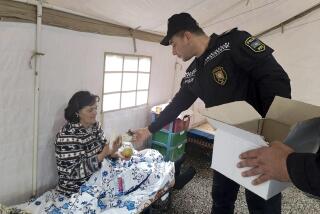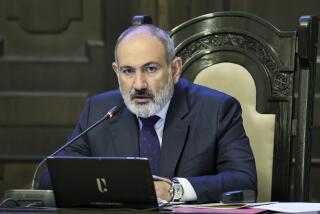Fear Mixes With Relief in Taliban-Free Cities
- Share via
TERMEZ, Uzbekistan — Anti-Taliban forces struggled to impose order in northern Afghanistan on Tuesday as unconfirmed reports surfaced of infighting among three opposition generals.
Several residents of the northern regional capital of Mazar-i-Sharif, captured by the anti-Taliban Northern Alliance on Friday, said the atmosphere in the city was a mix of relief and apprehension.
On one hand, women were shunning the burka, the opaque veil required by the Taliban, and walking in the streets with their faces uncovered and only scarves on their heads. Most shops have reopened.
But many residents remained fearful of venturing out as rumors circulated that gangs of fighters were entering homes and robbing their residents.
One man contacted by telephone said he can’t forget the bloodletting that followed the last time the anti-Taliban opposition took the city, in 1997.
Nothing Is Amiss, Alliance Officials Say
“The groups that fought before are fighting again,” said the man, who asked that his name not be used for safety reasons. “It seems they haven’t changed.”
Northern Alliance officials insisted that nothing was amiss inside Mazar-i-Sharif and said they have set up a police garrison to help restore law and order.
Mohammed Hashaf Nazim, an aide to alliance Gen. Ata Mohammed, denied reports of looting and other unrest.
“There have been a few incidents, but they are being investigated,” Nazim said.
“Our garrison will immediately deal with the situation. We’ve already investigated some of these people, and they were dealt with yesterday.” He declined to elaborate.
There were unconfirmed reports of fighting among forces loyal to three alliance commanders in the region--Ata, Gen. Abdul Rashid Dostum and Haji Mohammed Mukhaqiq.
But Nazim and other Northern Alliance officials said that the only fighting in the city was the continued search for a number of Taliban fighters who escaped from a standoff at a girls school in the city center over the weekend.
“Much of what you are hearing about is that until yesterday evening, we were searching for the terrorists who escaped from the school,” Nazim said by satellite telephone from Mazar-i-Sharif. “This morning, we dealt with them.”
The Taliban fighters, reported to be largely Arabs and other non-Afghans, barricaded themselves inside the school as other Taliban forces fled the city Friday night.
Northern Alliance officials insist that they offered the holdouts many opportunities to surrender, but the Taliban refused to give in, even killing some emissaries sent to negotiate.
“At that point our forces decided to capture them by force,” Northern Alliance Ambassador Mohammed Hasham Saad said in the Uzbek capital of Tashkent. “We had no choice but to kill them all.”
The continued instability around Mazar-i-Sharif threatens to further delay delivery of food to famine-stricken regions of northern Afghanistan.
Two barges loaded with wheat flour remained docked in the port in this border town Tuesday, waiting for the word that it was safe enough to move them across the Amu Darya River to Afghanistan.
Andrew Natsios, director of the U.S. Agency for International Development, lobbied the leadership in Uzbekistan on Tuesday to assist with delivery of famine relief, in part by reopening a bridge between this border town and Afghanistan.
The bridge was closed in 1998 after the Taliban seized control of Mazar-i-Sharif.
“We are facing a major famine in northern Afghanistan that predates Sept. 11,” Natsios told reporters as he inspected the loaded barges waiting in the port of Termez.
“We’ll use any method possible to move food in to avoid high death rates from this famine.”
Natsios said 1.5 million Afghans are in danger of starving in coming months due to the combined effects of three years of drought and 22 years of war.
Opening Bridge Would Help Food Deliveries
More than 5 million others have been “severely” affected by malnutrition and displacement, he said.
United Nations agencies have estimated that Afghanistan needs deliveries of 55,000 tons of food a month to stave off the famine. Opening the bridge would greatly increase the speed of those deliveries.
Uzbek officials, fearing incoming waves of refugees or Taliban fighters or both, have said they don’t want to open the bridge until they can be assured that security is tight on the other side.
Natsios said he told them that previous experience shows that refugee flows from famine are far larger and more uncontrollable than refugee flows from political conflict.
“The pressure from a famine is unlike anything they have seen before,” Natsios said.
More to Read
Sign up for Essential California
The most important California stories and recommendations in your inbox every morning.
You may occasionally receive promotional content from the Los Angeles Times.













